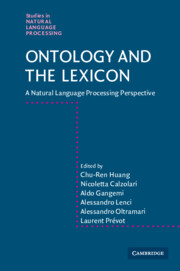Book contents
- Frontmatter
- Contents
- Contributors
- Preface
- Part I Fundamental aspects
- Part II Discovery and representation of conceptual systems
- Part III Interfacing ontologies and lexical resources
- Part IV Learning and using ontological knowledge
- 14 The life cycle of knowledge
- 15 The Omega ontology
- 16 Automatic acquisition of lexico-semantic knowledge for question answering
- 17 Agricultural ontology construction and maintenance in Thai
- References
- Index
14 - The life cycle of knowledge
from Part IV - Learning and using ontological knowledge
Published online by Cambridge University Press: 06 July 2010
- Frontmatter
- Contents
- Contributors
- Preface
- Part I Fundamental aspects
- Part II Discovery and representation of conceptual systems
- Part III Interfacing ontologies and lexical resources
- Part IV Learning and using ontological knowledge
- 14 The life cycle of knowledge
- 15 The Omega ontology
- 16 Automatic acquisition of lexico-semantic knowledge for question answering
- 17 Agricultural ontology construction and maintenance in Thai
- References
- Index
Summary
Introduction
Due to its prima facie abstract character, we are often led to conceive of knowledge as a changeless entity inhabiting an extra-time realm, much like Plato's World of Ideas. Hence, we tend to forget or underestimate the crucial fact that knowledge has its own life cycle, similar to anything else in the universe. Newly created knowledge changes over time: it may reproduce itself, generating new knowledge; it may die out, as proven by the fact that our knowledge about artefacts, practices, people, or places can disappear forever. In technical domains (such as, for instance, biology, medicine, computer science, and agriculture), as claimed by Kawtrakul and Imsombut (Chapter 17 this volume), the rate of knowledge change can be very high, in which concepts become ‘obsolete’ because of new technological advances, which, in turn, may induce complex reorganizations or expansions of the knowledge system. These similar processes apply to ontologies as well, since ontologies are formal systems aimed at representing a certain body of knowledge.
The dynamics of knowledge and ontologies depend on their contexts of use. Knowledge is created or acquired for some purpose, e.g. to be used as a tool to achieve a certain goal or to perform a particular task. Its usage also changes our knowledge about entities and processes, and, consequently, leads us to revise our ontological systems. Moreover, employing some body of knowledge to perform a task may produce new knowledge that has to be added to our ontologies, possibly resulting in a major revision of their structure, if some breakthrough in the knowledge system has occurred.
- Type
- Chapter
- Information
- Ontology and the LexiconA Natural Language Processing Perspective, pp. 241 - 257Publisher: Cambridge University PressPrint publication year: 2010
- 1
- Cited by

